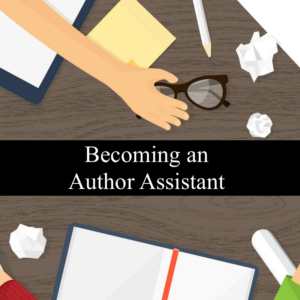 This is part two of a three part series on becoming an author assistant by Adriel Wiggins, virtual assistant and continuity editor.
This is part two of a three part series on becoming an author assistant by Adriel Wiggins, virtual assistant and continuity editor.
So now you’ve decided to be an author assistant. Great! Here are a few tips on how to build a professional business:
1. Build a website
Authors need to be able to find you somewhere on the internet. A full website, rather than just a social media page, is best. This gives you a place to announce your skillset, post testimonials from happy customers, post your availability or sales, make big announcements, and maybe even invoice your customers. Author assistants who have websites get more customers and make more money than those who only have a social media page. Even if you don’t know how to build a website, there are plenty of people who build them for a living. But you can find website building software from most of the major website hosting places. You don’t have to spend a lot of money for all the fancy bells and whistles. But make sure you pay for a reliable host, server, and security. Then make your website a showcase for your design, organization, coding, and other skills. The look and feel of a website will tell potential clients a lot about you.
2. Set up your finances
Do NOT, I repeat, DO NOT use the “friends and family” feature of PayPal to receive payments from your customers. This is a shady way to do business. Set up a business account on PayPal, or some other invoicing and money transfer site. Pay servers like Square and PayPal can integrate into your website so that authors can pay you easily and quickly. PayPal has its own invoicing service, but you can also find software like PerfexCRM and PayMo that will keep your timesheets and make invoices for you. If you wish to keep your business banking account separate from your personal finances (easier come tax season), set up an account at your bank, and link only to it from your online invoicing service.
3. Create a contract
Professional assistants have contracts. These keep both the assistant and any authors they work with safe in case something goes wrong. When I began, I started with a contract one of my author friends had from another vendor. Then, I googled “assistant contracts”, “editor contracts”, and “vendor contracts”. I cobbled together sections and paragraphs from the contracts I found, until I thought I had everything I needed. Then, I took it to a contract lawyer friend of mine and asked him if I was missing anything. Between experience as I added more authors and my lawyer friend’s advice, I added a couple more clauses. But now I have a standard contract that I have all authors I work for sign. It protects my business and my family.
4. Choose a file-sharing system
You’ll soon discover that you and authors send a lot of files back and forth. And it’s definitely convenient to be able to view and edit documents, spreadsheets, and other items simultaneously. Whether you use Google Drive or Dropbox or some other file sharing system, find one that will work for you. Project management systems like Slack and Trello can also share files quickly, and sort them by project.
5. Utilize a shared calendar app
Use Google Calendar or TeamUp to set deadlines, reminders, and recurring schedules. Google Calendar gives you the option of creating many different calendars, which can be shared with different people, and then you can view all or selected calendars at one time. This is by far the easiest way for me to see all projects I currently have going on, and which authors they’re with, while my authors are able to add tasks and deadlines to my list easily.
6. Decide on a way to handle passwords
Authors are trusting you with their business. Keep their trust by keeping their passwords safe. They can either send you a list of passwords and logins, use an app like Last Pass, or create logins and set permissions for you—although not every site has this ability. You can create separate logins on WordPress, Facebook business pages and groups, Amazon ads, and some mail clients like MailChimp. Some authors will not want their logins stored online, so you’ll have to keep a list on your local computer.
7. Begin marketing
Now you’re ready to start promoting yourself as an author assistant. Begin by letting your network of authors, author assistants, and book related vendors know that you’re open for business. Post in groups (that allow self-promotion). Send personalized soliciting emails to your favorite authors. Approach this like you would a book launch, which you should have already learned about while researching what all author assistants do. The more that you’ve done all the work listed out in Part One of this series, the easier this step will be.
Check out Part One of this series for tips on becoming an assistant and Part Three for a Q & A where I answer common author assistant questions. Or, check out Part One of Sara’s Working With an Author Assistant series.
 Hello! I’m Adriel Wiggins, wife, mother of three, fur mom, bibliophile, art geek, and all around student. I’ve been on a quest all of my life to learn as much as I possibly can about everything I possibly can. This has helped me tremendously in what eventually became my life’s purpose: to help other people become the best version of themselves. It is in that line that I became an assistant. You can check out my credentials and experience on my website. Stop by and see what books I’ve been reading!
Hello! I’m Adriel Wiggins, wife, mother of three, fur mom, bibliophile, art geek, and all around student. I’ve been on a quest all of my life to learn as much as I possibly can about everything I possibly can. This has helped me tremendously in what eventually became my life’s purpose: to help other people become the best version of themselves. It is in that line that I became an assistant. You can check out my credentials and experience on my website. Stop by and see what books I’ve been reading!

Recent Comments